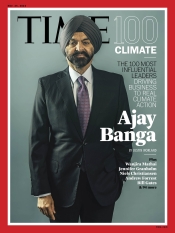Arizona State University President Michael Crow has been named to the 2024 TIME100 Climate list of leaders and innovators driving real climate action.

The list includes leaders across a range of fields, from policy to business to education. TIME’s editors spent months vetting names from across the economy. They prioritized measurable, scalable achievements and recent action over commitments and announcements.

Crow is the first university president to be named to the TIME100 Climate list.
He is joined by such fellow honorees as World Bank President Ajay Banga; Claudia Sheinbaum, president of Mexico; Prince Harry, Duke of Sussex; Bill Gates, founder of Breakthrough Energy and TerraPower, among other enterprises; Jennifer Granholm, secretary of the U.S. Department of Energy; and Gila River Indian Community Gov. Stephen Roe Lewis. This is only the second time the magazine has released its climate list.
The ASU president said the TIME100 Climate honor “is a welcome recognition of our university’s unique approach and impact.”
“We’re not focused on ‘the sky is falling’ or scare tactics — fear only inspires shortsighted, ill-conceived actions,” said Crow, who had been previously honored by the magazine when it named him one of the 10 best college presidents in 2009.
“We’re instead focused on finding solutions and results to some of society’s biggest challenges.”
Crow’s nearly four-decade-long conviction that the world’s leading universities are uniquely positioned — and have full responsibility — to lead in restoring and maintaining our relationship with the planet has driven many of his actions as a leader. His career path is full of early-stage actions and “firsts,” such as founding Columbia University’s world-renowned Earth Institute (today part of Columbia’s recently formed Climate School) and the Consortium for Science, Policy and Outcomes.
Since becoming president of ASU in 2002, he has transformed ASU into a powerhouse of climate-related action from Hawai’i to Bermuda, from deserts to rainforests and everywhere in between.
Among ASU’s recent innovations:
- This year, ASU became the first university to require a three-credit sustainability course as part of students’ general-education curriculum, regardless of major.
- In February, the university launched the Circular Plastics Microfactory, a first-of-its-kind facility for recycling and remanufacturing plastics, which is expected to divert 550 tons from landfills annually.
- In April, ASU launched a state-of-the-art coral research and propagation facility — the largest coral nursery of its kind — in Hawai’i, with the aim of restoring 120 miles of reefs off the Big Island.
- The National Science Foundation selected ASU earlier this year to lead a multi-institution enterprise to confront climate change in the Southwest and spur economic development.
- The U.S. Department of Energy in 2023 named ASU the anchor institution for EPIXC (Electrified Processes for Industry without Carbon), the DOE’s seventh Clean Energy Manufacturing Innovation devoted to the challenge of fighting greenhouse gas emissions from industrial process heating.
- Two years ago, ASU was tapped to lead the multiyear Arizona Water Innovation Initiative to help secure the state’s water supply based on the university’s successful programs in water science, technology, management and law.
The university has been driving innovation in this area for decades. ASU established the nation’s first School of Sustainability in 2006, two years after founding the Global Institute for Sustainability and Innovation, home to numerous programs tackling environmental crises.
Launched about a decade later, the Julie Ann Wrigley Global Futures Laboratory — comprising more than 70 units, centers, programs and initiatives, and five schools, including the School of Sustainability — is a first-of-its-kind entity modeled on the national labs and designed to serve as a “medical center for the planet.” Built on the diverse expertise of more than 855 scientists and scholars, it is the world’s first comprehensive research and education institution dedicated to the empowerment of our planet and its systems.
By Mary Beth Faller | November 12, 2024
Original Post
